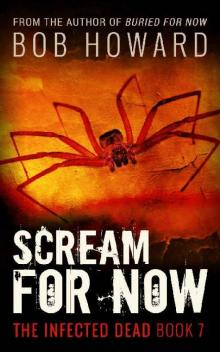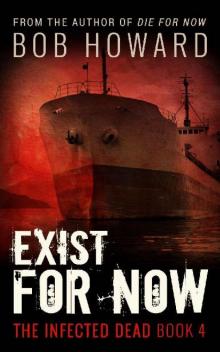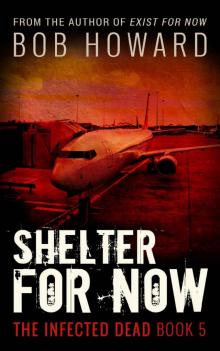- Home
- Howard, Bob
The Infected Dead (Book 4): Exist For Now Page 3
The Infected Dead (Book 4): Exist For Now Read online
Page 3
Others were wandering around inside the houseboat, bumping into each other and the furniture. The door must have been locked because I saw them repeatedly falling against the handle. All of them had sores and had lost their hair. Open mouths revealed that teeth had fallen out or had been broken when they tried to bite each other.
The startling lesson I had learned was that the people had died from radiation poisoning and had become infected dead. The only other alternative was that someone in their group had been bitten before they sought refuge in the houseboat. I wished over and over again that I had watched them at least long enough to know for sure.
The implications were obvious now. If people who had not been bitten died from radiation poisoning, there were going to be a lot more infected dead than living people, because there had been so few places where people could have gone to avoid the radiation.
I ran over to the radio and hailed Fort Sumter. I had to know if they were seeing the same thing. I needed to know if they were seeing what I had stupidly allowed myself to miss.
Captain Miller was paged to come to the control room as soon as I made contact, and he was either nearby, or he hurried from wherever he was to get to the radio.
“Ed, your timing is great. I was just about to contact you.”
“Captain, good to hear your voice. Are you seeing anything happening above the shelter?”
“That’s why I was about to check in with you. We’ve been watching everything go down as expected, but there appears to be a new development. The people who die of radiation poisoning are attacking the living.”
“Have they been bitten before they die?” I asked.
“I don’t think so, but we have a new problem. We don’t know if they are getting the infection by being bitten or because they have been eating the seafood.”
It hadn’t occurred to me even though it was something we had talked about often. There were infected dead out there biting the living to spread the disease. There was radiation falling from the sky that was going to gradually kill most of the people who were still outside and downwind, but there was always that big question about the food chain. I didn’t see the people go into the houseboat carrying any supplies, so they must have gone out fishing and crabbing while I had put them out of my mind.
Captain Miller continued, “We’ve been seeing it all along, but it wasn’t that big of a surprise when you get right down to it. We’ve been fairly certain that not everyone is getting bitten before they die and then come back, and I wouldn’t rule out the possibility that everyone we see has been forced to eat the seafood at some time or another. We’ve been talking about it in our daily updates to you guys, but I don’t think anyone was too focused on the obvious.”
I considered what he said and realized he was right. The radiation, the bites, and the food chain were all right there in front of us as three obvious ways to die.
The Chief came up behind me when he realized I was talking with someone on the radio.
“Is that Fort Sumter?” asked the Chief.
“Captain Miller’s on the line giving me an update about the people above the shelter. The people aren’t doing any better than the ones in our houseboat, but he said they’ve been eating the local seafood, so we still don’t know how they’re getting the infection.”
The Chief took the microphone and keyed it up.
“Captain Miller, any word from the area near the reactor? I’ve been watching the radiation monitors and talking with Doctor Bus about the levels. It’s bad enough to kill over a period of continuous exposure, but he thinks it could be far worse.”
“What are you thinking, Chief? You thinking this will be over sooner than we thought?” he asked.
“Bus says one good hurricane could clean this part of the coast pretty nicely.”
Captain Miller chuckled and said, “There’s a first. Somebody actually hoping for a hurricane to hit.”
“Do we have any weather intelligence, or do we have to just sit tight until a hurricane pops up?” I asked.
Captain Miller answered, “We established contact with the shelter on the oil rig in the Gulf of Mexico just about an hour ago. That was the other reason I was going to contact you. He said to pass along his regards to Bus and to Uncle Titus’ nephew.”
“Who did you talk to?” asked the Chief.
“Some guy named Maybank. He said he’s originally from the Charleston area, and he wishes he would have chosen the Fort Sumter site. He also wants to know if we ever heard from Jerry, the guy who was originally supposed to occupy this shelter. We told him the truth, and he said we would have liked Jerry.”
“Did Maybank have anything useful to pass along?” I asked.
“Yeah, he said the oil rig had been occupied by survivors from time to time, but they always make the same mistakes. Someone gets the infection, they start biting each other, and the next thing you know, they’re falling over the catwalk railings and open decks into the Gulf of Mexico. Sounds like Fort Sumter and your houseboat,” he said.
“What about the infection?” asked the Chief. “How does he think it’s getting onto the oil rig?”
“Maybank said there’s no doubt about it. They’re eating the seafood. He said the oil rig only had one occupant for a few weeks, and the guy seemed perfectly fine until one day when he just doubled over, got sick, and died. A few minutes later he got up and started wandering around until he found an open place where he could fall overboard. Maybank said he had considered the possibility of bringing the man inside the shelter, but he wasn’t sure about the seafood.”
The Chief and I studied each other for a minute, both undoubtedly thinking about the night we had encountered the marina full of people on the Stono River who were surviving on a steady diet of blue crab that had been surviving on a steady diet of infected dead. We finally had our answer. We had considered the possibility of returning to the area to see what had become of almost five hundred people, but in our hearts we had always suspected what we would find.
“What did Maybank have to say about the weather in the Gulf?” asked the Chief.
“That was why he wished he would have selected the Fort Sumter site,” said Captain Miller. “He said the oil rig doesn’t feel like it’s moving, and it isn’t moving, but when the whole Gulf looks like one big raging wave after the next, he said watching it can get you seasick.”
“The Gulf is having a tropical storm?” I asked. “Isn’t it a little early in the year for that?”
The Chief looked at me and grinned, but he spoke into the microphone to Captain Miller.
“Ed may be losing track of time now that he’s a married man and getting settled into a responsible life, Captain. He doesn’t realize it’s the first week of June.”
Captain Miller anticipated his next question and said, “Temperatures have been higher than normal, and Maybank said the storm was moving toward the Florida coast around the panhandle. That means we’re going to get some heavy rain even if we don’t get a hurricane or a tropical storm. He also said he hasn’t been getting any radiation down there, so the fallout looks like it’s localized.”
“That’s good news if it washes the radioactive dust off of the coast. Thanks, Captain. Keep us posted on the weather, and try to stay in contact with Maybank. By the way, I’ve been meaning to ask you a question.”
Jean stepped into the living room and caught my attention. When I looked at her, she motioned for me to come to her, and being a newlywed, of course I didn’t keep her waiting.
“I’ll be right back, Chief.”
He took my chair as soon as I left it, and leaned into the microphone, but I didn’t catch what he asked the Captain.
******
The rain began the next morning, and it came down hard. After breakfast the Chief told us all it was time to start getting ready to go outside. As soon as the rain ended he wanted to get some fresh readings of the radioactivity near the plane we had tied up near the houseboat. He wanted to take a radiation
monitor with him that hadn’t been used and see if it measured less than the monitors outside. That would tell us if the rain was lowering the radiation far enough to be safe.
I can’t say any of us were too happy with his decision to go outside so soon, but the Chief seemed to have something else on his mind, and he also seemed like he wanted to keep it to himself for the time being.
The Chief had some private discussions with Bus, and when I tried to pry it out of him, he just said Bus was coaching him about radiation safety. Jean told him that we all knew better. The Chief didn’t need any coaching on the topic. He acted innocent, but neither Jean nor Kathy could get him to tell us what was really going on.
We all followed the Chief and Bus to the room where we had suits and other outfits that were designed to protect the wearer from radiation. I quit trying to get the Chief to tell me what had built such a fire under him because he seemed determined to go out there. Bus wasn’t objecting as much as the rest of us, so he either knew something we didn’t, or he wasn’t as worried.
I helped the Chief put on one of the suits while the others stood back and watched. Kathy and Jean both had their arms folded across their chests and were standing defiantly between the Chief and the exit. Well, Jean actually was trying to fold her arms across her chest, but they were pretty much resting on top of her belly. She was due in only a few weeks, so she was really out there. I tried to get her to return a smile, but she was busy glaring at the Chief.
Tom had asked Molly to hang back inside and monitor the radio, and for once she didn’t seem eager to go. She was sensing that the grown-ups were different toward each other, and she didn’t like it. Tom wasn’t taking sides, but he looked as concerned as the rest of us.
“So, you’re just going out there by yourself?”
Kathy may have meant it as a question, but it came out more like a statement of fact.
“There’s something I need to do, and I don’t want anyone else taking risks just yet.”
That didn’t seem to make Kathy feel better. If anything it made her mad because he confirmed there was something going on. She shifted from one hip to the other, and I couldn’t say I had ever seen her looking at the Chief with such anger.
The Chief saw it, too. He had everything on except the headpiece, and he looked even bigger wearing the bright yellow suit, but he seemed to visibly get smaller as Kathy confronted him.
He gave in just a little and said, “How about letting it go for now, and I’ll tell you when I come back in. There’s no sense in discussing some of the issues if the radiation isn’t low enough anyway.”
Kathy studied him for a minute and then stepped out of his way. He gave her a slight nod and pulled the rest of his radiation suit on. For some reason he picked up one of the extra suits that was still in a sealed plastic bag.
The Chief walked past everyone without a word until he was at the door. When he stopped and faced us, I think everyone expected him to give up something about why it was so important for him to go outside, but he just waited.
Bus was the one who realized what the Chief was waiting for. There was no sense in giving anyone who wasn’t dressed in radiation control gear the opportunity to be exposed. Especially since one of them was pregnant.
“Everyone come back inside the shelter,” said Bus. “When the Chief opens the door he will let in at least some radioactive dust. Everyone but Jean should bring a RADCON suit back into the shelter. We can suit up in the shelter then come back and decontaminate the room.”
We silently gathered up the suits and went back into the shelter. Bus took a moment to place a new radiation detector in the room where the Chief stood waiting by the door, and a second detector was placed on the floor between that room and the door to the stairwell that went to the living quarters. As if by magic, Tom produced a large sheet of plastic and a roll of duct tape. I gave him a hand as we stretched it across the open door between the shower room and the smaller entrance that was more like a foyer. If there wasn’t much wind outside, the radioactive dust would probably be limited to the immediate area by the door.
I was the last one to go through the door, and I got one last look at the Chief. I couldn’t read the expression on his face because of the plastic sheet, so I just gave him a weak smile and pulled the door shut.
We all got into our radiation suits while Jean went to check the external camera views. As soon as she saw the Chief close the door, she signaled to us that he was clear. We all wanted to get the decontamination done as quickly as possible so we could get back inside and see what the Chief was doing. We finished squirming into our RADCON suits and then opened the hatch from the stairwell into the shower room just far enough for Bus to go through first.
It didn’t take more than a moment for him to confirm that there were readings of radioactive contamination on either monitor. We had been lucky because the entrance to the shelter faced the ocean instead of the mainland. If there had been contamination, the heavy rains had done a good job rinsing it off. Bus gave us the word that the rooms were safe, but he left the radiation detectors in place just to be sure.
When we finally made it back to Jean, she said the Chief would be coming into view at the dock at any moment unless he ran into some infected dead on the way. Judging by his almost immediate appearance, he must have had a clear path.
Without the slightest pause, the Chief went straight to the houseboat and yanked open the door. The first infected dead fell out so fast, it must have been leaning against it. The Chief stepped back and just let them pile up as they came out and fell over the arms and legs of the first ones. As one of them gained its footing and stumbled toward the Chief, he just calmly brushed the reaching arms to the side and marched the walking corpse over the right side of the dock.
We all had to look away for a moment when the toddlers came through the door. A moment was all it took for the Chief to send them into the water. It couldn’t have been more than two minutes before the Chief had dispatched all of them, and he stuck his head through the door of the houseboat. I looked at the camera view that showed the inside, and I saw there was one infected dead moving in the direction of the door. The Chief’s massive gloved hand shot into view and grabbed the withered body by a wrist. He pulled so hard that I thought the arm would come out of the socket, and I looked at the outside monitor just in time to see him pull it into view and push it over the side. I didn’t notice he was still holding the arm by the wrist until he tossed it into the water where its owner had disappeared. We had seen that happen plenty of times in the past.
The Chief had to know we would be watching, but he didn’t even glance toward the camera that was strategically hidden at the end of the dock. We saw him take one of the new radiation detectors out of its package, study it for a minute, and then he placed it on top of one of the dock pilings where we could clearly see that the needle was still resting on the zero line. The rain had apparently done its job.
The Chief didn’t waste any time getting into the de Havilland Beaver. The restored seaplane, or float plane, as Bus had called it, roared to life. We couldn’t hear it, but we knew what it would sound like. It was a powerful plane, and it was incredibly loud.
I think we all had our mouths hanging open when the Chief started the plane. If not, they certainly were when Molly pointed at the lower part of the monitor.
“Who’s that?” she asked.
Another yellow RADCON suit came into view, and the wearer walked up to the plane and stepped easily onto the float next to the dock. The newcomer was exchanging words with the Chief, and at one point stepped off of the float, wrapped the mooring lines around a piling, and then stepped back onto the float. I thought I caught a glimpse of blond hair through the headpiece.
“Where’s Kathy?” I asked.
Everyone looked at each other as if we expected to see Kathy standing in the room with us.
“I think we know the answer to that question,” said Jean.
“Thank you, Mrs. Ob
vious, but what’s she doing out there?” I regretted the question even as I asked it.
Jean didn’t give me the usual teasing scowl when she looked at me, and Bus stifled a laugh. Even Molly was grinning, and Tom was doing a good job faking like he was looking for something on the control panel to the monitors.
“Do you like staying in the doghouse, Mr. Obvious?” Jean emphasized mister.
I decided I would only stick my foot deeper in my mouth, so I turned my attention back to the monitor. We were all just in time to see that Kathy had untied the plane and was climbing into the back door behind the pilot seat of the Beaver. As she did, she gave a hard push with her foot, and the plane was gliding away from the dock.
Under power the plane quickly crossed the bow of the houseboat and then turned toward the northern entrance of the moat. It rushed toward the open sea, and was in the view of the ocean side camera in seconds. All we could do was watch it take off.
It was one thing to not know what the mission was, and it was entirely something else to watch the Chief and Kathy leave as if we had done something wrong. We sat in silence until Jean finally asked what was the last thing I remembered from the night before when the Chief had been talking with Captain Miller.
I told her we had been talking about the weather in the Gulf of Mexico, and that a tropical storm was going to be pushing some heavy winds and rain ahead of it. I thought it meant the winds would shift the fallout from the Oconee Nuclear Reactor more to the north. Then I remembered that the Chief was just about to ask Captain Miller about something else, and Jean had asked me to come help her with something. The Chief was just signing off when I had returned to the room.
We all knew that whatever they had discussed, it had caused the Chief to try to leave on his own, and even though we didn’t like being in the dark, it felt much better knowing Kathy was in the plane with him.

 The Infected Dead (Book 7): Scream For Now
The Infected Dead (Book 7): Scream For Now The Infected Dead (Book 6): Buried For Now
The Infected Dead (Book 6): Buried For Now The Infected Dead (Book 4): Exist For Now
The Infected Dead (Book 4): Exist For Now The Infected Dead (Book 2): Survive For Now
The Infected Dead (Book 2): Survive For Now The Infected Dead (Book 5): Shelter for Now
The Infected Dead (Book 5): Shelter for Now